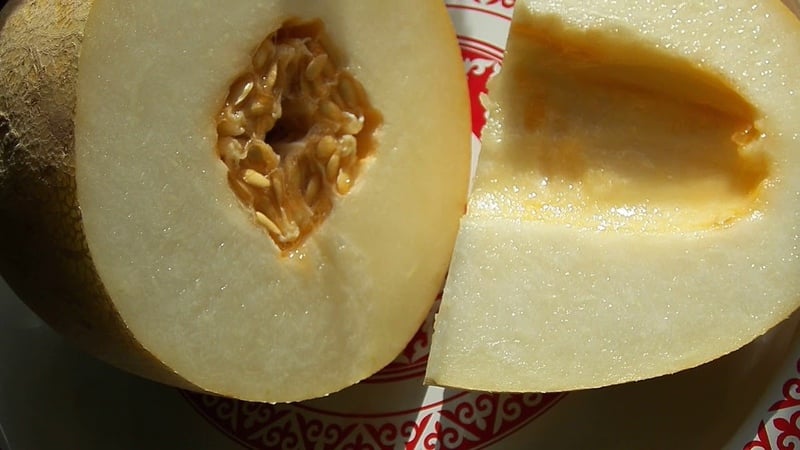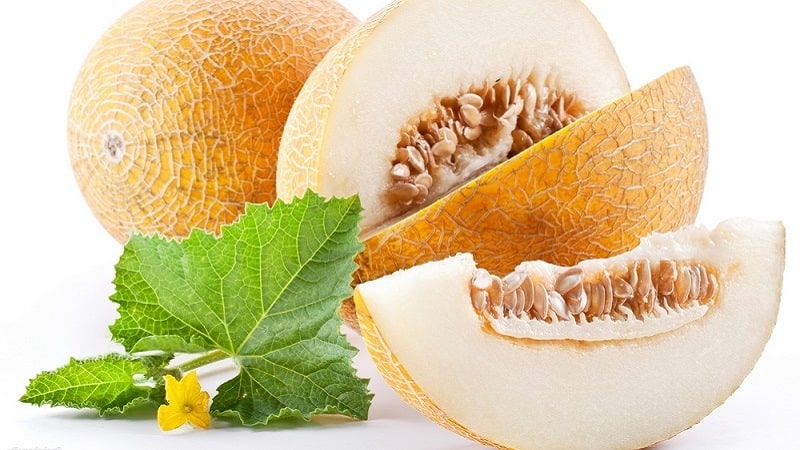Why does melon smell like acetone and is it safe to eat?
Sweet, aromatic melon is one of the best desserts. The honey fruit came to us from hot Asia. More than a hundred are grown in Uzbekistan varieties this culture.
However, it happens that a delicacy purchased in a store or grown independently does not meet expectations. Sweet slices disappoint with an unpleasant acetone aroma and strange taste. In this article we will figure out why melon smells like acetone and whether it is possible to eat such a vegetable.
The taste and smell of acetone in melon
The acetone taste doesn't just happen. This phenomenon has very specific reasons. An off-flavor may appear in fruits as a result of improper care during the growing process, for example, adding too much fertilizer to the soil. Or the treatment of fruits with chemicals during storage and transportation of melons to the point of sale. However, this is not a complete list of reasons.
Possible consequences of eating fruits with an acetone odor

If the product looks good, there are no signs of spoilage, but there is a persistent smell and taste of acetone, that is, it is still not worth it. Chemicals that have been used on the fetus may cause the disorder. stomach or even poisoning.
Attention. At the end of the melon season, in the second half of September, melons are often treated with chemical compounds to prevent spoilage.
The risk of poisoning increases when purchasing melons after the season ends. Pregnant and lactating women should be especially careful when consuming melons.For a child's body, melon with the taste and smell of acetone is extremely dangerous.
The following process leads to the appearance of the taste and smell of acetone:
- To ensure that delicate fruits withstand transportation well, they are removed from the garden before they reach technical ripeness. Melons ripen in unnatural conditions.
- Unsuitable conditions for ripening (too high temperature) and sugar content of the pulp lead to the fermentation process beginning in the fruits. The result of fermentation is the formation of alcohols.
- During further storage of fermented fruits, the alcohol oxidizes. Oxidation produces aldehydes and then ketones. A typical representative of saturated ketones is acetone. The fermented pulp begins to smell like acetone.
This unpleasant phenomenon happens not only with sweet melon, but also with some fruits, such as bananas.
But it happens that a melon without signs of rotting, with dense pulp, without damage, gives off a pungent odor of alcohol. In this case, the cause of the unpleasant taste and aroma lies in the treatment of fruits with chemicals. Vegetables and fruits treated with special chemicals have good shelf life and an attractive appearance, but it is not safe to eat such fruits.
Varietal features
Judging by the reviews of those who have encountered a similar problem, the taste and smell of acetone is most often found in melons of the variety Torpedo. This variety of crop ripens at the end of August, but Torpedo is sold in stores until the beginning of October.
Distinctive features of the variety:
- oblong shape;
- the average length of the fruit is about 30 cm;
- weight from 5 to 15 kg;
- The peel of the fruit is covered with a network of veins.
Torpedoes have relatively good shelf life and can withstand transportation well.But the shelf life of the delicacy is very short, so you should not purchase Torpedoes after the end of the season.
Is it possible to eat this melon?
So, there are two possible reasons for the acetone taste and smell of melon:
- An unpleasant odor appears in overripe fruits. Ripening melons (as well as bananas, mangoes, pomelo) begin to ferment. During the fermentation process, sweet fruits digest themselves. Overripe melons are distinguished by soft skin and loose flesh that spreads when pressed.
- The taste and smell of acetone is caused by chemicals. Fruits are treated with chemicals during growth, as well as after removal from the garden to extend shelf life.
Is it possible to eat melon that smells like acetone? No. If the melon has fermented, it means that bacteria are multiplying in it and their waste products are accumulating.
If the unpleasant taste and smell are caused by excess fertilizers or treatment with chemical compounds, then eating such fruits is also unsafe. Such a product will cause stomach upset or even poisoning. An excess of nitrates is indicated by grayish and empty melon seeds and the absence of a pronounced melon aroma.

Recommendations for selection
It is easy to distinguish a ripe and tasty product from a dangerous one:
- To begin with, the fruit is smelled. Melon ripened in the garden exudes a subtle sweet aroma. If there is a herbal smell or there is no smell at all, then the melon is unripe.
- Then melon carefully examine. The peel should not have any mechanical damage, dents or cuts. The correct coloring is uniform, without green streaks or spots. Blue and pink spots indicate the use of aerosol-type preservatives. The color of a healthy fetus is even, without pigmentation.
- The melon peel must be felt. A fruit that is noticeably hard to the touch is unripe, and a soft fruit is overripe. When pressed with your finger, the surface should spring back and not spread. When you tap on a ripe fruit, a dull sound is heard.
You should not buy melons near busy roads, parking lots and other polluted and polluted places. It is dangerous to buy cut melons.
Read also:
What vitamins are in melon and how it is beneficial for the body.
Conclusion
The smell and taste of acetone in melon indicates that the product is overripe and fermented. Or the fruits are treated with chemicals. In both cases, eating such a delicacy is dangerous.
To avoid poisoning, carefully inspect and feel the melon fruits before purchasing. Purchase the product from trusted individuals who are personally involved in growing melons.
Oil and little useful information